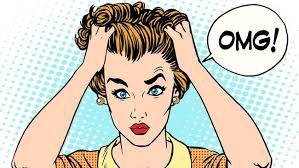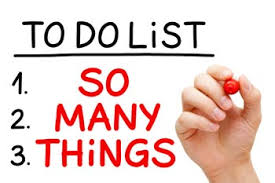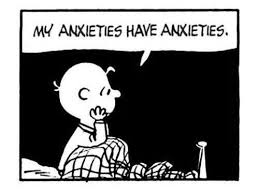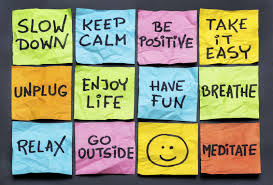Stress and anxiety is something all of us experience and typically gets a bad wrap. For the most part the stress we refer to is self-induced and inherit in the way we live. We’re fast paced, tend to prioritize work, eating fast and hurried, are success oriented, worry about our health and the health of loved ones. And that’s all fine and good, many times stress comes from the rigors of being healthy and productive. Like taking care of kids or working hard on our fitness and eating healthy by preparing all your meals.

Stress isn’t necessarily bad. A tree grows stronger branches and deeper roots if it’s constantly barraged from wind. Our muscles grow bigger and stronger when stressed with exercise. So there’s good and bad stress. As Douglas Malloch wrote in his poem “Good Timber”:
“Good timber does not grow with ease:
The stronger wind, the stronger trees;
The further sky, the greater length;
The more the storm, the more the strength.
By sun and cold, by rain and snow,
In trees and men good timbers grow.
”
If there’s an emergency and your bodies flight-or-fight response kicks in, that’s a good response to stress. The issue comes when the stressor is chronic, or perceived as bad stress, and we have the wrong response to it. I say “perceived as bad” cause what is good stress for one may not be good stress for another. The stress of a few rounds of boxing sounds fun to me but my mother would not like that stress at all!

Anxiety is a sensation in the body that something isn’t right. Resulting in a chemical cascade produced the body that causes a general feeling of uneasiness, rapid heart beats and rapid, shallow breathing, a choking sensation, tightness in the chest, and many more symptoms. Just like stress, anxiety can be normal. Standing up to talk in front of a crowd can cause anxiety. According to The Anxiety and Depression Association of America, anxiety disorders are the most common mental illness in America. Anxiety disorders occur earlier in women versus men, and women are more likely to have multiple psychiatric disorders during their lifetime. The most common occurrence with anxiety is depression.

Stress and anxiety are completely manageable, even without one of the 84 or so anti-anxiety medications. A unique perspective from Jacob Teitelbaum, MD on healing applies especially well to stress and anxiety. He states there are 4 key domains to healing and complete healing is unlikely to occur unless all areas are addressed:
- Biochemistry: Herbals, nutrition, and medications
- Structural: Physical manipulation, surgery, breathing, and exercise
- Biophysics: Acupuncture, yoga, chakra work, qi gong, tai chi
- Mind-Body-Spirit: Understanding how the body is a metaphor for what is occurring at a deeper level
I love this perspective cause this is where I approach and treat stress and anxiety. Because I KNOW it works. I emphasize “know” because I like to point out how we know something. We say we know something cause we experience it or we’ve heard about it from an authoritarian source. You know what grass is cause you’ve seen it, touched it, smelled it, experienced it. You may say you know Saturn is a planet, but have you seen it, touched it, smelled it, or experienced it? Likely not, but you’ve heard it from an expert of some sort so you know it. My favorite way of knowing is combining both of these, experiencing something and having validation from an expert. I KNOW these approaches to managing stress anxiety work cause I’ve experienced them work on myself and patients, and have spent countless hours reading research on them.
Chronic stress wrecks havoc on our bodies biochemistry, elevating cortisol which leaves it depleted to do other functions and levels to low can trigger anxiety attacks. Chronic stress and anxiety are known risks factors for so many conditions, including heart disease, obesity, metabolic syndrome, high blood pressure, stroke, decreased immune function, and even cancer.
So what are these slayers of stress and anxiety abolishers? Interestingly I’ve noticed everybody responds a bit different to stress and anxiety therapies. I use a combination of herbs, nutrition, exercise, and meditation as my go-to approach. Sometimes it takes a little more digging to unmask the culprit. Balancing one’s biochemistry can by an overt issue, such as balancing thyroid hormones, progesterone in women, testosterone in men, and addressing adrenal fatigue. Improving blood sugar levels can have a profound effect on anxiety. There’s been numerous studies on exercise being just as or more effective the pharmaceuticals when treating anxiety. There are many, many herbs that treat stress and anxiety, both on a biochemical level and energetic. Herbs can help us adapt to many stressors. Meditation studies have shown it balances the hormones and neurotransmitters that cause us to feel anxious and stressed. There are so many natural ways with far fewer side effects compared to drugs prevent stress and anxiety wrecking havoc on our health.

If you or a loved one experience bad stress, anxiety, panic attacks that are difficult to get under control then set up an appointment.
What approaches to stress and anxiety have worked best for you? Comment below on your stress success.
Travis Whitney, NMD, MSc




